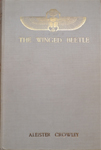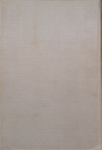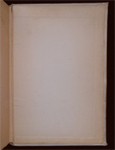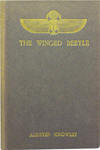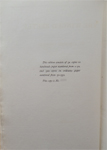100th
MP

|
THE
100th
MONKEY
PRESS |
|
|
|
Limited Editions by Aleister Crowley & Victor B. Neuburg |
|
Bibliographies |
|
Download Texts
»
Aleister
Crowley
WANTED !!NEW!!
|
|
THE WINGED BEETLE |
|
Image Thumbnails |
||||||||||||||||||||||||||||||||||||||||||
|
Title: |
The Winged Beetle. |
|
||||||||||||||||||||||||||||||||||||||||
|
Variations: |
|
|||||||||||||||||||||||||||||||||||||||||
|
Publisher: |
Privately published.6 |
|||||||||||||||||||||||||||||||||||||||||
|
Printer: |
Turnbull & Spears.6 |
|||||||||||||||||||||||||||||||||||||||||
|
Published At: |
London.1 |
|||||||||||||||||||||||||||||||||||||||||
|
Date: |
1910.1 |
|||||||||||||||||||||||||||||||||||||||||
|
Edition: |
1st Edition. |
|||||||||||||||||||||||||||||||||||||||||
|
Pages: |
x + 228.2 |
|||||||||||||||||||||||||||||||||||||||||
|
Price: |
State (a) sold for one guinea and State (b) sold for 10 shillings.3 |
|||||||||||||||||||||||||||||||||||||||||
|
Remarks: |
The Poetry Review indicates that a new edition of The Winged Beetle was published by Wieland in 1912.8 J. F. C. Fuller designed the book's cover.5 Dedicated to J. F. C. Fuller. A December 1918 inventory of Crowley’s books held for him by Charles Whittingham & Co., also known as the Chiswick Press, lists 232 regular copies and 32 de-luxe copies as bound but unsold.7 Approximately 100 copies of the regular edition were destroyed in a flood that occurred at the facility were they were being stored.7 Contains a “Glossary of Obscure Terms” tipped in to the rear of the book which shows the third stanza of the dedication in verse to read: “Yea! God himself upon his throne, “Cringed at thy torrid truculence, “Tottered and crashed a crumpled crone. “At thy contemptuous ‘Slave get hence!’ “Out flickered the Ghost’s marish tongue, “And Jesus wallowed in his dung.”4 |
|||||||||||||||||||||||||||||||||||||||||
|
Pagination:2 |
|
|||||||||||||||||||||||||||||||||||||||||
|
Contents: |
- Rosa Coeli - Abjad-i-Al’Ain - The Hermit - The Wizard Way - The Wings - The Garden of Janus - The Two Secrets - The Priestess of Panormita - The Hawk and the Babe - The Duellists - Athor and Asar - After Judgement - The Five Adorations - Telepathy - The Swimmer - The Muse - The God and the Girl - Rosemary - Au Bal - Dorothy - Bathyllus - The Mantra Yogi - The Poet and His Muse - Lilith - Sport and Marriage - The Twins - The Convert - The Sorceress - The Child - Clytie - A Slim Gilt Soul - The Silence of Columbine - The Archaeologist - The Ladder - Belladonna - The Poet at Bay - Ut - Rosa Decidua - The Circle and the Point - In Memoriam - Ad Fidelum Infidelem - The Sphinx - The Jew of Fez - The Pentagram - Song - An Hymn - Prologue to Rodin in Rime - The Camp Fire - Ave Adonai - The Wild Ass - The Opium-Smoker - In Manu Dominae - Mr Todd: A Morality - L’Amour et le Crane - L'Alchimie de Douleur - Le Vampire - Le Balcon - Le Gout de l’Infini - L’Heautontimoroumenos - Le vin de l’assassin - Woman - Tout Entiere - Le vin des amants - Le Revenant - Lola de Valence - Le Beau Navire - L’Invitation au Voyage - Epilogue to “Petits Poems en Prose” - Colloque Sentimental - En Sourdine - The Magician |
|||||||||||||||||||||||||||||||||||||||||
|
Author’s Working Versions: |
|
|||||||||||||||||||||||||||||||||||||||||
|
Other Known Editions: |
|
|||||||||||||||||||||||||||||||||||||||||
|
Bibliographic Sources: |
|
|||||||||||||||||||||||||||||||||||||||||
|
Comments by Aleister Crowley: |
Fuller was at this time in grave difficulties, à la d’Artagnan, but he gave his time and his toil with magnificent generosity. His draughtmanship, within certain limits, was miraculously fine. Certain subjects were altogether beyond him; he could not portray the human figure. His “Adonai-Ha-Aretz” is lamentable, but his symbolic drawing shows the highest qualities of imagination and execution, and his geometrical work is almost inconceivably perfect. His four Watch Towers (The Equinox, vol. I, no. VII) and similar illustrations are superb, and his ornamental alphabet is altogether beyond me to appreciate. Unfortunately, his prose was florid and confused, and he suffered acutely from what I call the “comma bacillus”. He loved a sentence so much that he could not persuade himself to finish it, but his images are more vivid and virile than those of any writer I have ever known. The style of The Star in the West is trenchant and picturesque. Its only fault is a tendency to overloading. I could have wished a more critical and less adoring study of my work; but his enthusiasm was genuine, and guaranteed our personal relations in such sort that my friendship wit him is one of the dearest memories of my life. I dedicated The Winged Beetle to him. — The Confessions of Aleister Crowley. New York, NY. Hill and Wang, 1969. Page 544. |
|||||||||||||||||||||||||||||||||||||||||
|
Reviews: |
The Winged Beetle. Poems by Aleister Crowley. London: Privately Printed. Price 10s. net. (Copies can be obtained at The Equinox, 124, Victoria Street, S.W.) In the face of the whole horde of reviewers, critics, and in the face of the British public, I declare that Aleister Crowley is among the first of English living poets. It will not be many years before this fact is generally recognized and duly appreciated. “Rosa Coeli” and “Rosa Decidua” are two magnificent poems. The latter is no “tragedy of little tears,” but the utterance of a god-like grief. “The Princess of Panormita” is an extremely fine work of art; the right of selection has been exercised to the utmost, there are no superfluous words, no vague images; everything is precise, clear-cut, and strong. I quote two verses—
“But—God! I was not content With the blasphemous secret of years, The veil is hardly rent While the eyes rain stones for tears. So I clung to the lips and laughed As the storms of death abated, As the storms of the grievous graft By the swing of her soul unsated.
* * * * *
“Nay! let him fashion an arrow Whose heart is sober and stout! Let him pierce his God to the marrow! Let the soul of God flow out! Whether a snake or a sun In his horoscope Heaven hath cast, It is nothing: every one Shall win to the moon at last.”
“Bathyllus” is a beautiful poem; the following four lines contain some extraordinary thought-pictures—
“My head is an ocean in anger With sleek and fantastical curls; My lips like a sunset for langour, My skin like a moonrise of pearls.”
And the verse below is exquisite—
“Then, O if my pain were to kill me!— In the garden of music and musk Touch thou—and the thoughts of it thrill me— The poppy that flowers in the dusk! Poppy whose blossom is furled Deep in the breasts of the world— Ah! but the heart is impearled!”
“The Ladder” is a fine lyric describing the ascension up the middle pillar of the Tree of Life from Malkuth to Kether. “Telepathy,” “The Opium-Smoker,” “The Muse,” are all poems which will grip and hold the soul of the reader. “The Muse” is quoted in its entirety—
“O Thou who art throned by the well That feeds the celestial streams! O daughter of heaven and hell! O mother of magical dreams! O sister of me as I sit At thy feet by the mystical well And dream with the web of my wit Of the marriage of heaven and hell!
“O Thou who art mad with the Muse That delights in the beauty of form! O desire of the dream of the dews! O Valkyrie astride of the storm! I am thine as we ride on the blast To exult in the mystical Muse, As there drip on the desert at last The immaculate Delian dews.
“I am thine, I am thine, I am thine,— How it slashes the skies as a sword! How it blinds us and burns us with wine Of the dread Dionysian Lord! Evoe! Evoe! Evoe! Iacche! thy chrism of wine! Evoe! Evoe! Evoe! I am thine! I am thine! I am thine!”
What is not least remarkable in Crowley’s poetry is his amazing variety. Frequently he is reminiscent of Swinburne. In some respects he is not unlike William Blake, but he is free from Blake’s metrical deficiencies while retaining all the sublimity of his conceptions. The range of his subjects is almost infinite, and the majority of his poems are literally ablaze with the white heat of ecstasy, the passionate desire of the Overman towards his ultimate consummation, reunion with God. Meredith Starr. —The Occult Review, April 1911 |
|||||||||||||||||||||||||||||||||||||||||
